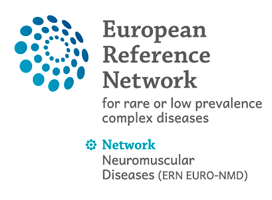European Reference Networks (ERNs) are designed to improve patient health outcomes by prioritizing clinical excellence and equitable access to care across Europe. Rare disease patient organisations, in particular EURORDIS – a non-profit alliance of over 1,000 rare disease patient organisations from 74 countries – have played a key role in the development of these networks.
Patient representatives, as experts with lived experience, are an integral part of ERNs and actively participate in decision-making and operational processes. Their involvement helps to ensure that the networks achieve their objectives, including improving patient outcomes and access to care.
In EURO-NMD, patient involvement is facilitated by the Patient Advisory Board (PAB), which comprises 10 members from 10 European patient organisations, and a total of 36 patient representatives from 36 patient organisations in 14 European countries. Each patient representative must have a strong understanding of rare neuromuscular diseases from a patient perspective and be a member of a legally registered patient organisation. This ensures that patients are not only representing their personal experience, but also the needs of their communities.
The patient organisations involved in EURO-NMD include a wide range of groups, from national disease-specific organisations (CIDP Italia, Duchenne Parent Project Spain, Gli Equilibristi, ALS Liga Belgium, etc.) to European federations dedicated to a specific pathology or group of diseases (EAMDA, World Duchenne Organisation, EPODIN, etc.). They also include national organisations for neuromuscular diseases (AFM-Téléthon, Spierziekten Nederland, FFM Norway, etc.).
Patient representatives involved in EURO-NMD play an active role in several key network activities, collaborating with clinicians, researchers and other patient representatives to:
- Develop clinical guidelines and specialized social services guidelines and outcome measures, ensuring that these instruments meet patient needs.
- Contribute to the creation of patient-centered information, including treatment policies, good practice guidelines and patient journeys.
- Participate in developing monitoring processes to evaluate the ERN’s performance and outcomes, ensuring patient feedback is integrated into decision-making.
- Disseminate information to their patient organisation and the broader patient community, as well as other healthcare professionals.
- Create educational materials for patients, families, and healthcare providers and participate in teaching activities.
- Help shape research priorities based on patient needs and involve patients in research activities.
- Advise on ethical issues, including personal data protection and informed consent.
- Engage with specific patient communities for disease-focused projects.
In addition, the PAB will identify new patient organisations to include under-represented disease groups or patients from other EU countries, thus promoting greater inclusivity within the network.

